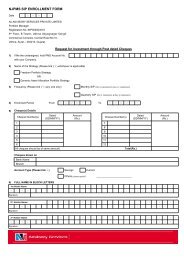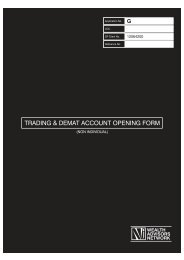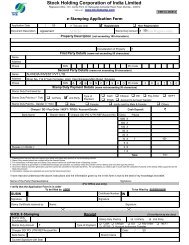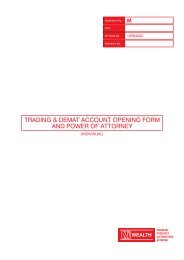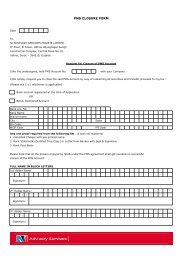TRADING & DEMAT ACCOUNT OPENING FORM - NJ PMS
TRADING & DEMAT ACCOUNT OPENING FORM - NJ PMS
TRADING & DEMAT ACCOUNT OPENING FORM - NJ PMS
Create successful ePaper yourself
Turn your PDF publications into a flip-book with our unique Google optimized e-Paper software.
RISK DISCLOSURE DOCUMENTof market participants to buy and/or sell securitiesexpeditiously at a competitive price and with minimalprice difference. Generally, it is assumed that more thenumbers of orders available in a market, greater is theliquidity. Liquidity is important because with greaterliquidity, it is easier for investors to buy and/or sellsecurities swiftly and with minimal price difference, andas a result, investors are more likely to pay or receive acompetitive price for securities purchased or sold.There may be a risk of lower liquidity in some securitiesas compared to active securities. As a result, yourorder may only be partially executed, or may beexecuted with relatively greater price difference or maynot be executed at all.a) Buying/selling without intention of giving and/ortaking delivery of a security, as part of a day tradingstrategy, may also result into losses, because in such asituation, stocks may have to be sold/purchased at alow/high prices, compared to the expected price levels,so as not to have any obligation to deliver/ receive asecurity.1.3 Risk of wider spreads: Spread refers to thedifference in best buy price and best sell price. Itrepresents the differential between the price of buyinga security and immediately selling it or vice versa.Lower liquidity and higher volatility may result in widerthan normal spreads for less liquid or illiquid securities.This in turn will hamper better price formation.1.4 Risk-reducing orders: Most Exchanges have afacility for investors to place "limit orders", "stop lossorders" etc". The placing of such orders (e.g., "stoploss" orders, or "limit" orders), which are intended tolimit losses to certain amounts may not be effectivemany a time because rapid movement in marketconditions may make it impossible to execute suchorders.a) A "market" order will be executed promptly, subjectto availability of orders on opposite side, withoutregard to price and that, while the customer mayreceive a prompt execution of a "market" order, theexecution may be at available prices of outstandingorders, which satisfy the order quantity, on price timepriority. It may be understood that these prices may besignificantly different from the last traded price or thebest price in that security.b) A "limit" order will be executed only at the "limit" pricespecified for the order or a better price. However, whilethe customer receives price protection, there is apossibility that the order may not be executed at all.c) A stop loss order is generally placed "away" from thecurrent price of a stock, and such order gets activated ifand when the stock reaches, or trades through, the stopprice. Sell stop orders are entered ordinarily below thecurrent price, and buy stop orders are entered ordinarilyabove the current price. When the stock contractreaches the pre-determined price, or trades throughsuch price, the stop loss order converts to a market limitorder and is executed at the limit or better. There is noassurance therefore that the limit order will beexecutable, since a stock might penetrate the predeterminedprice, in which case, the risk of such ordernot getting executed arises, just as with a regular limitorder.1.5 Risk of news announcements: Issuers make newsannouncements that may impact the price of thesecurities. These announcements may occur duringtrading, and when combined with lower liquidity andhigher volatility, may suddenly cause an unexpectedpositive or negative movement in the price of thesecurity.1.6 Risk of rumours : Rumours about companies attimes float in the market through word of mouth,newspapers, websites or news agencies, etc. Theinvestors should be wary of and should desist fromacting on rumours.1.7 System risk: High volume trading will frequentlyoccur at the market opening and before market close.Such high volumes may also occur at any point in theday. These may cause delays in order execution orconfirmation.a) During periods of volatility, on account of marketparticipants continuously modifying their order quantityor prices or placing fresh orders, there may be delays inorder execution and its confirmations.b) Under certain market conditions, it may be difficultor impossible to liquidate a position in the market at areasonable price or at all, when there are no outstanding24



